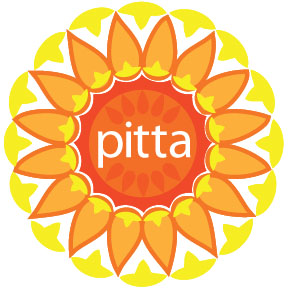Before beginning to explain about how to reduce or pacify the Pitta dosha you may want to read about Tridoshas, and Tridoshic Recipes if you have not already. Pitta is responsible for all type of transformations in the body and has the qualities of being: Hot, Sharp, Liquid and Oily. Therefore anything (food or lifestyle) that has those qualities will increase Pitta, because of the rule “Like increases Like.” So most of us can benefit from “Cooling It”, particularly in the hot summer months of June, July and August.
| Balance – Pitta | Imbalance – Pitta | |
|---|---|---|
| Eat main meal at noon with the bulk of the food being Sweet, Astringent, Bitter in taste and slightly dry in texture. Make sure the food is pure and wholesome | Eat hot, spicy, oily food being mostly pungent, sour and salty in taste | |
| Work in a cool, dry environment where you feel you are in control (such as your own business) | Work in the hot sun for long periods of time, in a job were you feel you have little control | |
| Seek balance in all things, alternate hard work with leisure and rest | Being judgmental and overly critical | |
| Decrease the use of stimulants. Use cooling bitter herbs like aloe vera, dandelion, gentian and cilantro | Use stimulants – alcohol, coffee, tea, cigarettes | |
| Wear clothing that is warm color such as red, orange, yellow or a calming color like green | Wear clothing that creates lightness in the body such as purple, blue and white | |
| For leisure time choose calming activities such as quiet walks in nature or parks | For leisure time do stimulating activities, amusement parks, discos, rock concert | |
| Wear clothing made of natural fiber such as cotton or silk. The best colors are lighter colors like white, cream, blue, green and purple | Wear clothing that is bright red, yellow, orange or black | |
| Take cool walks in the moonlight | Excessive heat like too much sun, hot tubs or saunas |
Pitta Pacifying (reducing) Food List
Grains: White basmati rice, barley, corn, couscous, oat bran, oats, wheat, wheat bran
Vegetables: Bitter leafy greens, asparagus, broccoli, cabbage, cauliflower, celery, cucumber, mushrooms in small amount, okra, onions (cooked in ghee), peas, sweet peppers, sweet potatoes, pumpkin, sprouts, squash, green beans, zucchini.
Legumes: Aduki beans, black beans, black-eyed peas, chick peas (garbanzo beans), kidney beans, most other beans, lentils, peas, soy products, must be cooked properly, once or twice a week.
Spices: Cooling spices like cardamom, coriander seed, cilantro leaves, fennel, fresh basil, dill, turmeric, small amounts of cumin and fresh ginger.
Fruits: Sweet fruits such as apples, apricots, avocado, berries, coconuts, dates, figs, grapes, sweet melons, sweet oranges, plums, pomegranates.
Dairy: Most fresh dairy is good such as fresh ghee, fresh whole milk (properly cooked).
Meats: Pittas are best suited with a vegetarian diet; however, the following meats are the least aggravating: chicken (white meat), turkey (white meat) which should be baked or broiled.
Nuts: Few nuts, most are too oily and heating, sunflower and almonds can be good in moderation.
Oils: Ghee, sunflower, olive, canola, small amounts of sesame.







